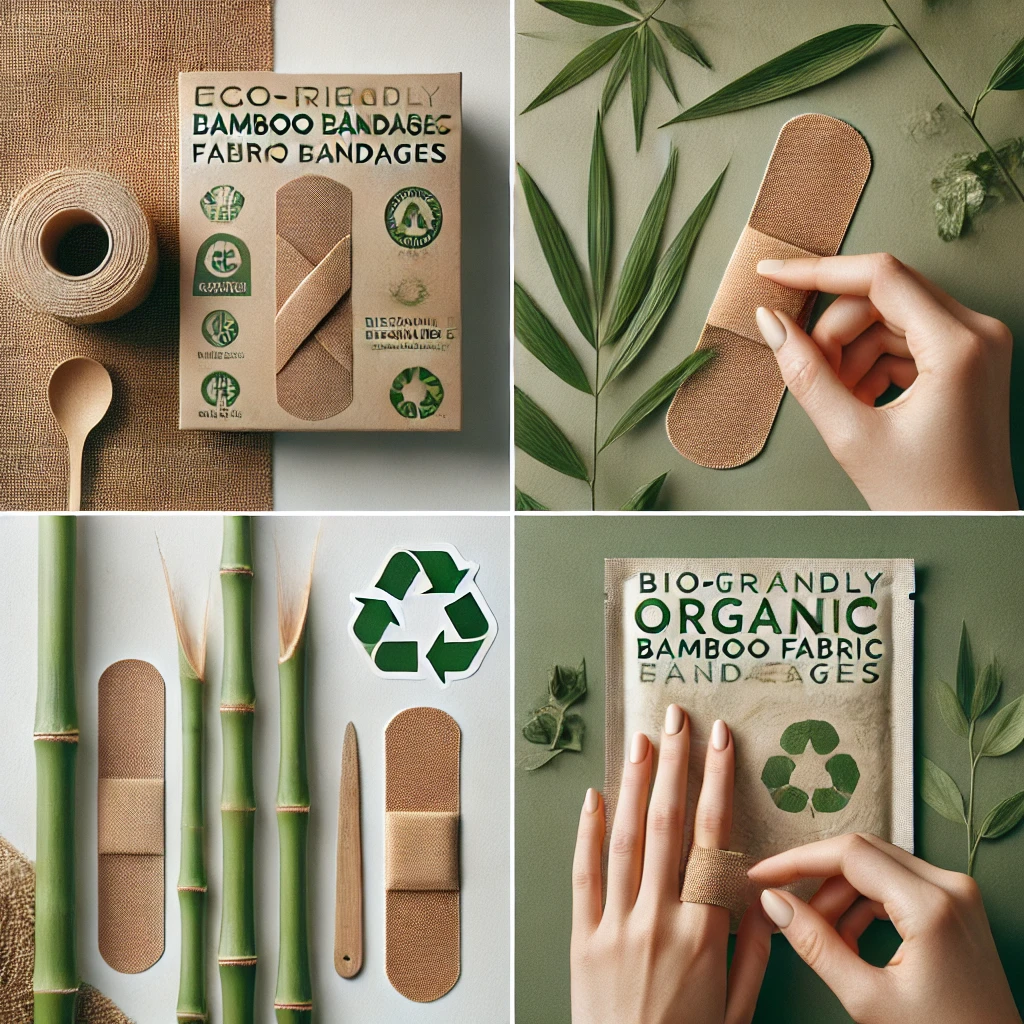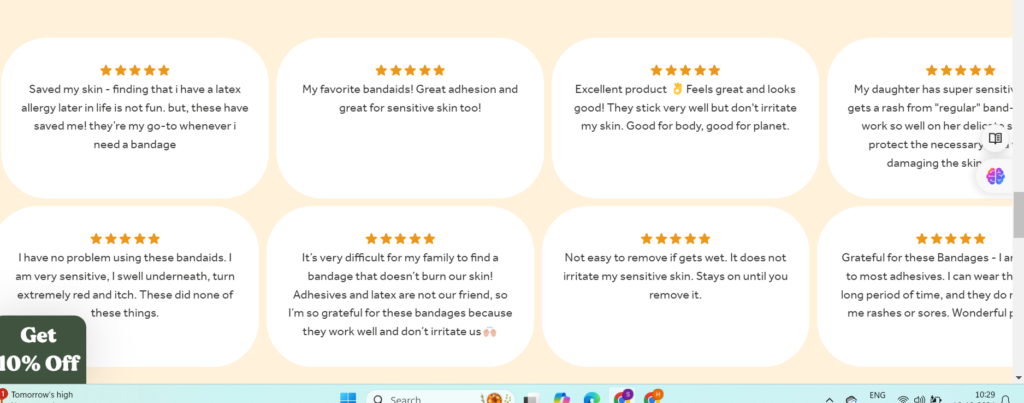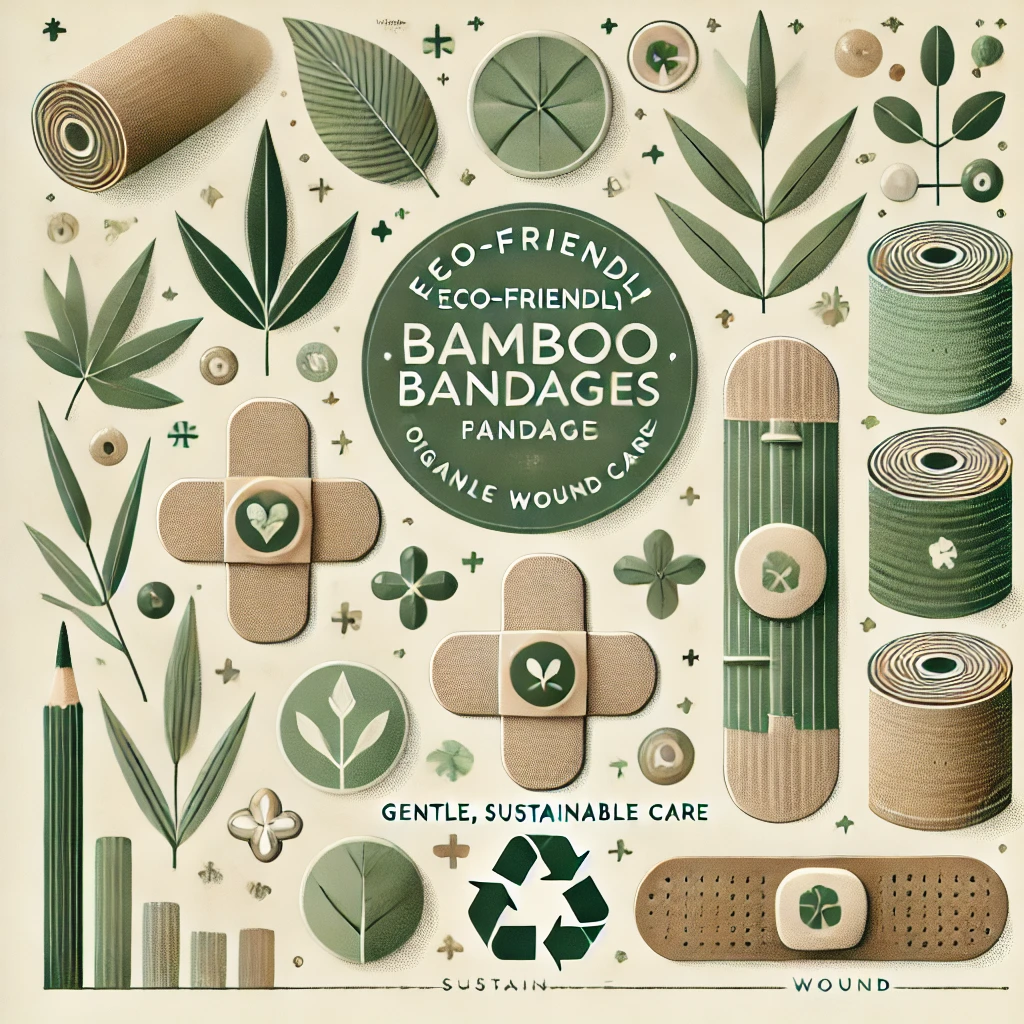In today’s world, sustainable living extends beyond our food choices and wardrobe into everyday essentials like first aid. FEBU Eco-Friendly Organic Bamboo Fabric Bandages are an excellent option for those seeking an eco-conscious approach to wound care without compromising on comfort or effectiveness. This guide explores FEBU bandages in depth, highlighting their unique features, benefits, and the reasons they’re a superior alternative to traditional bandages.
Table of Contents
What Makes FEBU Eco-Friendly Organic Bamboo Fabric Bandages Stand Out?
FEBU bamboo bandages are crafted from organic bamboo fabric, known for its sustainability and skin-friendly properties. These bandages provide a safe, hypoallergenic solution for minor wounds, offering an alternative to traditional plastic and synthetic options that can irritate the skin and harm the environment.

1. Features and Benefits of FEBU Eco-Friendly Organic Bamboo Fabric Bandages:
a. Organic Bamboo Fabric
Bamboo is a renewable resource, growing quickly and requiring minimal water and pesticides. FEBU uses certified organic bamboo, ensuring the material is sustainably sourced. The bamboo fabric is incredibly soft and breathable, naturally contouring to the skin for a secure, comfortable fit. This flexibility allows FEBU bandages to remain in place, even on joints or areas where movement is frequent.
b. Hypoallergenic and Safe for Sensitive Skin
Conventional bandages often contain latex and harsh adhesives that can irritate sensitive skin. FEBU bandages, however, are hypoallergenic and latex-free, making them a safe choice for everyone, including individuals prone to allergies or skin sensitivities. The adhesive is made from natural ingredients, ensuring that even the most delicate skin types can use these bandages comfortably.
c. Biodegradable and Compostable
FEBU bandages break down naturally in a composting environment within a few weeks, unlike conventional plastic bandages that can take hundreds of years to decompose. This biodegradability ensures that FEBU bandages contribute minimally to landfill waste, supporting eco-friendly and zero-waste lifestyles.
The compostable nature of these bandages doesn’t just end with the product itself; their packaging is made from recyclable cardboard, further reducing environmental impact. By choosing FEBU, consumers can feel confident that their choice supports a sustainable and eco-conscious lifestyle.
2. How to Use FEBU Eco-Friendly Organic Bamboo Fabric Bandages Effectively
FEBU bandages are as easy to use as traditional options. Here’s a step-by-step guide to ensure optimal healing:
- Clean the Wound: Before applying the bandage, thoroughly clean the wound with water or a suitable antiseptic. This step helps prevent infection and prepares the skin for the bandage.
- Dry the Area: Make sure the skin is dry, allowing the bandage’s adhesive to stick properly.
- Apply the Bandage: Peel the bandage off its compostable backing and place it over the wound. The natural adhesive will secure it in place, even as you move.
3. Why Switch to FEBU Bandages? Environmental and Health Benefits
a. Reducing Plastic Waste
Traditional bandages, especially plastic-based ones, significantly contribute to the global plastic waste crisis. They often take centuries to decompose, adding to the growing volume of landfill waste. FEBU bandages, on the other hand, are designed to be fully compostable, allowing consumers to reduce their plastic footprint significantly. By switching to FEBU, you are taking a step towards more sustainable living.
b. Safer for Your Skin
People with sensitive skin or allergies often find it challenging to use conventional bandages due to the synthetic materials and chemicals they contain. FEBU bamboo bandages solve this problem by using organic, skin-friendly ingredients that eliminate the risk of allergic reactions. The absence of harsh chemicals like methylisothiazolinone (MI) and coconut derivatives ensures that these bandages are safe even for those with specific sensitivities.
c. Natural Healing Properties
The breathable bamboo fabric allows for proper air circulation, which is crucial for wound healing. Airflow helps wounds dry faster and prevents moisture buildup that can lead to infections. This natural approach to wound care promotes faster healing, making FEBU bandages a practical and effective choice.
4. Product Variants and Versatility
FEBU Eco-Friendly Organic Bamboo Fabric Bandages are available in multiple sizes and shapes, making them suitable for various types of wounds:
- Standard Strip Bandages: Ideal for small cuts, abrasions, and minor scrapes. These bandages provide sufficient coverage and stay secure, ensuring that the wound remains protected while healing.
- Long Strips for Large Wounds: These bandages are designed for larger wounds, offering versatile coverage that protects the entire area【8†source】.
- Bandages for Joints: FEBU also offers bandages specifically designed to bend and flex with joints, such as elbows and knees. This flexibility ensures the bandage remains secure and comfortable, even during movement.
5. How to Dispose of FEBU Bandages Responsibly
FEBU Eco-Friendly Organic Bamboo Fabric Bandages align with the principles of zero-waste living. Here’s how to dispose of them properly:
- Remove the Bandage: Once the wound has healed or you need to replace the bandage, carefully remove it from the skin.
- Compost It: If you have a compost bin, place the used bandage inside. The organic bamboo fabric and natural adhesive will break down within weeks, turning into compost that enriches the soil.
By composting FEBU bandages and their packaging, you contribute to a sustainable cycle that minimizes environmental impact and supports soil health.
6. Customer Reviews and Testimonials: Real-Life Feedback on FEBU Bandages

FEBU bandages have garnered positive feedback from a diverse range of users:
- Comfort and Durability: Many users appreciate the softness of the bamboo fabric and how well the bandages stay in place during daily activities. The bandages’ flexibility allows them to move naturally with the skin, which is particularly useful for wounds on joints.
- Safe for Sensitive Skin: Customers with allergies and skin sensitivities have praised the bandages for being irritation-free, noting that they experienced no reactions, even with prolonged use.
- Eco-Conscious Packaging: Users committed to reducing plastic waste are pleased with FEBU’s compostable packaging, which complements their zero-waste lifestyles.
7. Comparing FEBU Bandages with Conventional Bandages
To highlight why FEBU Eco-Friendly Organic Bamboo Fabric Bandages are a superior choice, let’s compare them with traditional options:
| Feature | Traditional Bandages | FEBU Bamboo Bandages |
|---|---|---|
| Material | Plastic or synthetic fabric | Organic bamboo fabric |
| Allergen Content | May contain latex and synthetic adhesives | Hypoallergenic and latex-free |
| Environmental Impact | High due to plastic waste and chemicals | Low, biodegradable and compostable |
| Breathability | Limited | High, promoting faster wound healing |
| Flexibility | Rigid, may peel off | Soft, contours to skin comfortably |
8. Comparing FEBU with Other Sustainable Bandage Brands
While FEBU is a standout in the market of eco-friendly bandages, there are other brands offering similar products. Here’s a comparison to help you understand where FEBU excels and how it differs from other options:
| Brand | Material | Biodegradability | Hypoallergenic | Price Range |
|---|---|---|---|---|
| FEBU | Organic bamboo fabric | Fully compostable | Yes, latex-free | Moderate |
| PATCH | Organic bamboo | Fully compostable | Yes, coconut-based | Moderate to high |
| Welly | Recycled fabric | Partially compostable | Yes, synthetic-free | Moderate |
| EcoFlex | Hemp and bamboo mix | Fully compostable | Yes, latex-free | Higher price point |

Key Takeaways from the Comparison
- FEBU vs. PATCH: Both brands offer bamboo-based, compostable bandages, but PATCH uses coconut oil as an added ingredient. FEBU’s advantage lies in its simpler, hypoallergenic formula that avoids allergens like coconut derivatives, making it a better option for those with specific sensitivities.
- FEBU vs. Welly: While Welly uses recycled fabric, it is not fully compostable and may not decompose as quickly as FEBU’s bamboo material. Welly’s bandages are a sustainable choice, but they may not be the best option for those committed to zero-waste living.
- FEBU vs. EcoFlex: EcoFlex combines hemp and bamboo, which is an innovative approach; however, the higher price point can be a deterrent. FEBU offers a more affordable option with similar biodegradability and eco-friendly benefits.
read this also: Sustainable Home Decor: Creating a Stylish and Eco-Friendly Space
9.Pros and Cons of FEBU Eco-Friendly Organic Bamboo Fabric Bandages:
Like any product, FEBU bandages come with both advantages and disadvantages. Understanding these can help you decide if they’re the right choice for you.
Pros:
- Eco-Friendly and Biodegradable: Made from organic bamboo, these bandages are fully compostable, reducing environmental impact compared to conventional plastic bandages.
- Hypoallergenic: Ideal for people with sensitive skin or allergies, as they are free from latex and synthetic adhesives.
- Flexible and Comfortable: The bamboo fabric is soft and contours naturally to the skin, making them perfect for use on joints and areas with frequent movement.
- Sustainable Packaging: The bandages come in recyclable and compostable packaging, supporting a zero-waste lifestyle.
Cons:
- Higher Price Point: FEBU bandages may be more expensive than conventional options, which can be a deterrent for some consumers.
- Limited Availability: Depending on your location, finding these bandages in local stores may be challenging; most purchases are made online.
- Not Suitable for All Wound Types: While great for minor cuts and abrasions, these bandages might not be ideal for larger wounds or specific medical needs requiring specialized bandages.
check it out here : https://amzn.to/3NtVacG
10. Frequently Asked Questions (FAQs)
Q: Are FEBU bandages suitable for children?
Yes, FEBU bandages are hypoallergenic and gentle, making them safe for children and infants. They offer soft, comfortable protection without irritating sensitive skin.
Q: How long does it take for FEBU bandages to biodegrade?
When disposed of in a composting environment, FEBU bandages typically break down within a few weeks.
Q: Are FEBU bandages effective for all wounds?
FEBU bandages are designed for everyday wounds like cuts, scrapes, and abrasions. They provide secure coverage and promote optimal healing through their breathable bamboo fabric.
11.Conclusion: Why Choose FEBU Eco-Friendly Organic Bamboo Fabric Bandages?
FEBU Eco-Friendly Organic Bamboo Fabric Bandages are a fantastic choice for those looking to minimize their environmental impact while maintaining effective and gentle wound care. With their biodegradable design, hypoallergenic properties, and versatility, FEBU bandages cater to a wide range of needs, from daily cuts to sensitive skin requirements. Choosing FEBU is not only a step towards a healthier lifestyle but also a conscious effort to protect the planet.
Switching to FEBU bamboo bandages ensures that you are making a responsible and sustainable choice, supporting both your well-being and the environment.
Share this content:

